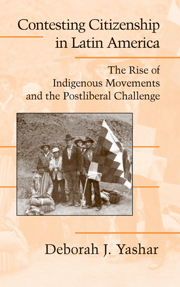 Contesting Citizenship in Latin America
Contesting Citizenship in Latin America Book contents
2 - CITIZENSHIP REGIMES, THE STATE, AND ETHNIC CLEAVAGES
Published online by Cambridge University Press: 05 September 2012
Summary
At a national scale effective citizenship is a necessary condition of democracy…. Without effective citizenship, no regime provides sufficient breadth, equality, binding consultation, or protection of participants in public politics to qualify as democratic
(Tilly 1999: 256).Citizenship is at the core of democracy. It is also at the core of indigenous mobilization in Latin America and beyond. For if Indians are contesting the terms of citizenship, they are also contesting their unequal experiences with it. But what is citizenship? Who gets to be a citizen? And how is citizenship experienced? These are basic questions. Yet they have been largely sidelined in studies of third wave democracies. Indeed, democratization studies for the most part have tended to assume that the category, boundaries, and experiences of citizenship are given and preconstituted. While there have been notable exceptions, most recent studies have tended to focus on the institutions that define democracy rather than the people who take part and the terms by which they do so.
It is no longer possible to ignore citizenship (and its links to ethnicity) in democratization studies. For with the turn to competitive electoral regimes, we have witnessed the (re)emergence of groups committed to redefining citizenship. These are not “simply” struggles to expand the suffrage to excluded groups. Rather, the new struggles have increasingly assumed an ethnonational cast and have taken two broad forms.
- Type
- Chapter
- Information
- Contesting Citizenship in Latin AmericaThe Rise of Indigenous Movements and the Postliberal Challenge, pp. 31 - 53Publisher: Cambridge University PressPrint publication year: 2005
- 1
- Cited by
